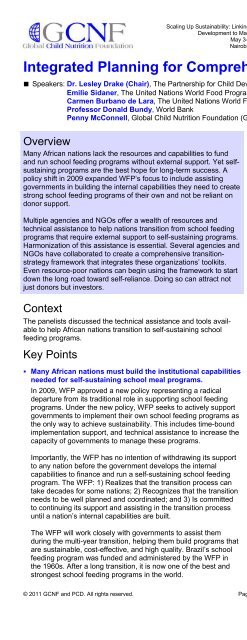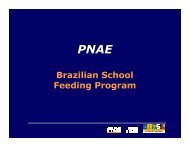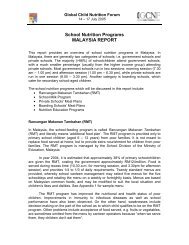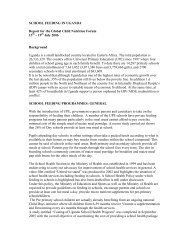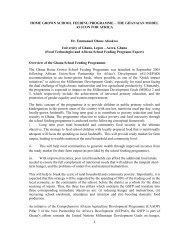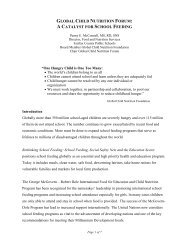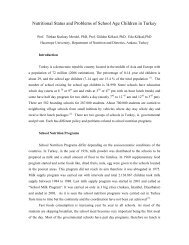EXECUTIVE SUMMARY - Global Child Nutrition Foundation
EXECUTIVE SUMMARY - Global Child Nutrition Foundation
EXECUTIVE SUMMARY - Global Child Nutrition Foundation
Create successful ePaper yourself
Turn your PDF publications into a flip-book with our unique Google optimized e-Paper software.
Scaling Up Sustainability: Linking School Feeding with Agriculture<br />
Development to Maximize Food Security<br />
May 3-7, 2011<br />
Nairobi, Kenya<br />
Integrated Planning for Comprehensive Technical Assistance<br />
■ Speakers: Dr. Lesley Drake (Chair), The Partnership for <strong>Child</strong> Development (PCD)<br />
Emilie Sidaner, The United Nations World Food Programme (WFP)<br />
Carmen Burbano de Lara, The United Nations World Food Programme (WFP)<br />
Professor Donald Bundy, World Bank<br />
Penny McConnell, <strong>Global</strong> <strong>Child</strong> <strong>Nutrition</strong> <strong>Foundation</strong> (GCNF)<br />
Overview<br />
Many African nations lack the resources and capabilities to fund<br />
and run school feeding programs without external support. Yet selfsustaining<br />
programs are the best hope for long-term success. A<br />
policy shift in 2009 expanded WFP’s focus to include assisting<br />
governments in building the internal capabilities they need to create<br />
strong school feeding programs of their own and not be reliant on<br />
donor support.<br />
Multiple agencies and NGOs offer a wealth of resources and<br />
technical assistance to help nations transition from school feeding<br />
programs that require external support to self-sustaining programs.<br />
Harmonization of this assistance is essential. Several agencies and<br />
NGOs have collaborated to create a comprehensive transitionstrategy<br />
framework that integrates these organizations’ toolkits.<br />
Even resource-poor nations can begin using the framework to start<br />
down the long road toward self-reliance. Doing so can attract not<br />
just donors but investors.<br />
Context<br />
The panelists discussed the technical assistance and tools available<br />
to help African nations transition to self-sustaining school<br />
feeding programs.<br />
Key Points<br />
Many African nations must build the institutional capabilities<br />
needed for self-sustaining school meal programs.<br />
In 2009, WFP approved a new policy representing a radical<br />
departure from its traditional role in supporting school feeding<br />
programs. Under the new policy, WFP seeks to actively support<br />
governments to implement their own school feeding programs as<br />
the only way to achieve sustainability. This includes time-bound<br />
implementation support, and technical assistance to increase the<br />
capacity of governments to manage these programs.<br />
Importantly, the WFP has no intention of withdrawing its support<br />
to any nation before the government develops the internal<br />
capabilities to finance and run a self-sustaining school feeding<br />
program. The WFP: 1) Realizes that the transition process can<br />
take decades for some nations; 2) Recognizes that the transition<br />
needs to be well planned and coordinated; and 3) Is committed<br />
to continuing its support and assisting in the transition process<br />
until a nation’s internal capabilities are built.<br />
The WFP will work closely with governments to assist them<br />
during the multi-year transition, helping them build programs that<br />
are sustainable, cost-effective, and high quality. Brazil’s school<br />
feeding program was funded and administered by the WFP in<br />
the 1960s. After a long transition, it is now one of the best and<br />
strongest school feeding programs in the world.<br />
© 2011 GCNF and PCD. All rights reserved. Page 23<br />
A comprehensive transition-planning framework integrates<br />
toolkits and resources from various sources.<br />
PCD, WFP and the World Bank have worked to consolidate<br />
existing guidance so that countries have access to a package<br />
that is harmonized and easy to use. This technical assistance<br />
framework is based on three principles, echoed throughout the<br />
Forum:<br />
Government ownership and leadership, with a national<br />
strategy for sustainable school feeding prioritized at the<br />
highest levels.<br />
Multi-sectoral approaches to school feeding programs, with<br />
consultation and collaboration among ministries involved.<br />
One common framework. This framework has five pillars:<br />
1. Policy<br />
2. Funding<br />
3. Institutional Arrangements and Coordination<br />
4. Design and Implementation (involving local production)<br />
5. Community participation<br />
Decisions in each of these areas guide the transition strategy.<br />
The framework entails the following steps:<br />
Vision and goals. This step defines the country’s rationale for<br />
school feeding and how it fits in the country’s overall povertyreduction<br />
strategy. Tools include: GCNF’s School Feeding<br />
Toolkit (Step 1), and WFP’s Investment Case.<br />
Assessment. This defines a country’s situation, identifying<br />
capability gaps. Tools include: SABER (the World Bank’s<br />
System Assessment and Benchmarking for Education<br />
Results), WFP’s Needs and Coverage Analysis, Cost Analysis<br />
tools (in development), and GCNF Toolkit (Steps 2 and 3).<br />
Strategic planning. This involves consultative processes<br />
among government ministries and integrating agriculture with<br />
school feeding. Tools include: Technical Assistance Plan<br />
(TAP) and GCNF Toolkit (Step 4).<br />
Monitoring and evaluation, which is ongoing. The strategy<br />
should be a “living document,” continually being improved<br />
upon as informed by data and feedback, monitoring,<br />
evaluating, and assessment. Tools include: technical support<br />
for monitoring and evaluation process design; SABER followup;<br />
GCNF Toolkit (Step 5); and impact evaluations on home<br />
grown school feeding.<br />
The World Bank’s SABER tool is part of an effort to benchmark<br />
all education sub-systems (the inclusion of school feeding in<br />
education sub-systems is a positive recent development).<br />
SABER is available on the World Bank’s website.<br />
PCD, in conjunction with the Home Grown School Feeding<br />
program’s partners, supports governments to develop Technical


